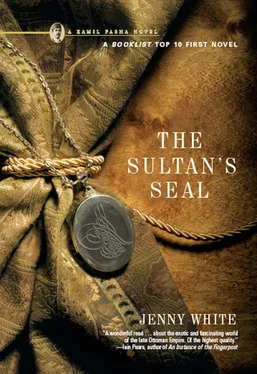Jenny White - The Sultan's seal
Здесь есть возможность читать онлайн «Jenny White - The Sultan's seal» весь текст электронной книги совершенно бесплатно (целиком полную версию без сокращений). В некоторых случаях можно слушать аудио, скачать через торрент в формате fb2 и присутствует краткое содержание. Жанр: Исторический детектив, на английском языке. Описание произведения, (предисловие) а так же отзывы посетителей доступны на портале библиотеки ЛибКат.
- Название:The Sultan's seal
- Автор:
- Жанр:
- Год:неизвестен
- ISBN:нет данных
- Рейтинг книги:5 / 5. Голосов: 1
-
Избранное:Добавить в избранное
- Отзывы:
-
Ваша оценка:
- 100
- 1
- 2
- 3
- 4
- 5
The Sultan's seal: краткое содержание, описание и аннотация
Предлагаем к чтению аннотацию, описание, краткое содержание или предисловие (зависит от того, что написал сам автор книги «The Sultan's seal»). Если вы не нашли необходимую информацию о книге — напишите в комментариях, мы постараемся отыскать её.
The Sultan's seal — читать онлайн бесплатно полную книгу (весь текст) целиком
Ниже представлен текст книги, разбитый по страницам. Система сохранения места последней прочитанной страницы, позволяет с удобством читать онлайн бесплатно книгу «The Sultan's seal», без необходимости каждый раз заново искать на чём Вы остановились. Поставьте закладку, и сможете в любой момент перейти на страницу, на которой закончили чтение.
Интервал:
Закладка:
“I came to tell you I was leaving.”
“Leaving Istanbul?” I felt regret and relief. I pulled my veil across my breasts. “When?”
“In a few days.”
It was too soon. “Has something happened?” I shivered with dread at losing my friend. The strength of my feeling surprised me.
“A good thing, Jaanan,” she said with a grin. “I still can’t believe it.” “Tell me,” I demanded. “I am full of suspense.”
“Well,” she began, drawing it out, “I am now a woman of means.”
“Means?”
“Rich, Jaanan. I’m rich!” She bounced on the divan.
“Why, that’s wonderful.” I laughed with relief. “I’m so happy for you, my dear friend. Congratulations.”
“It means I can do as I please. When you have money, no one can tell you how to live.”
“How did it happen?” I had assumed that since Mary worked, she belonged to a family without wealth, but I realized then that she had never told me anything about her family.
“My father died.”
“Oh, I’m so sorry. Health to your head, my dearest.” I reached out to comfort her, but she leaned back so she could see my face, grasped my arms, and beamed at me.
“I’m not sad, Jaanan. Not sad at all. My father threw me out when I was young. That’s how I ended up in a boardinghouse, exchanging kitchen work for rent.”
I gasped. “How is such a thing possible?”
“He said I had unnatural inclinations, as he put it. And he didn’t like my friends.”
“But had you no other family to turn to? Your mother? Your siblings?”
“My mother died when I was born,” she explained, a flicker of sadness passing through her eyes, her finger caressing the gold cross at her neck. “I have no brothers or sisters. It’s not like here where you can fall back on dozens of people you call family. In England, you’re on your own.”
“And your friends?”
“Well, I told you about my friends. They turned out less than worthless. On that account, my father was right.”
“That’s terribly sad, Mary, dear. You have a family and friends here, though. I am here for you, and all my family is yours.”
Mary’s eyes fell to one side. “I know,” she whispered. “Thank you.
“Actually, Jaanan”-quickly, almost shiftily, the pink tip of her tongue moistened her lips-“I came here to ask you something.”
There are moments when you understand that something is going to happen before you know what it is. There is an unpleasant weightlessness at the back of your neck. Time yawns as if to show its unconcern, then rushes toward you at breakneck speed.
“Would you come with me to England?”
I was speechless.
“It would be great fun. We could live in a grand place, much nicer than here.” She waved her hand around the reception hall.
She leaned closer and stroked back my veil again.
“We could be together, Jaanan. You and me. We wouldn’t have to sneak off to that shack on the water.” Her lips brushed my ear. “We could be together all the time.”
I admit to confusion and knowledge chasing each other through my heart. Mary was my friend and I loved her. Now she was offering me a new life, a life of novelty and adventure, as had been foretold. I considered carefully. What life was left to me in Istanbul? Perhaps this was my kismet.
Mary mistook my silence for refusal. “If you’re worried about missing your family, Jaanan, you could travel here whenever you like. The Wagons-Lits Company is building a direct rail line. Before long you’ll be able to get on the Orient Express in London and get off in Stamboul.” She clapped her hands. “Wouldn’t it be wonderful? We could have such a life together.”
Hamza, I thought. My hands toyed with the sea glass dangling from my neck. Hamza would never leave here. England would be exile.
“I don’t know, Mary.” I said slowly. “Let me think about it.”
Mary leaned closer to read from my face what she could not read from my words, but I’m certain my confusion made me illegible.
She stroked my cheek, then pulled my veil back across it. “I’ll wait patiently until you decide, Jaanan.”
After Mary left, I found Violet in the kitchen wrestling a bucking fish from the pail at her feet onto the cutting board. She pierced its neck with the point of her knife and it stiffened.
“Where is the cook?” I asked her.
“Her mother is ill, so she went home early. I told her I’d prepare the meal.”
The scales sprayed from beneath her knife as it scraped across the firm blue flesh. I watched as she held the fish down and, entering at the throat, slid the knife delicately down the chest and along the belly. Its ruby secrets spilled into her hand.
I found the letter under a pile of manuscripts on a shelf in Ismail Dayi’s study. I had been looking for an illustrated copy of Fuzuli’s romance, Leyla and Mejnun, that Ismail Dayi had found for me at the bookseller. It was to be a gift for Mary, in remembrance of our friendship, a celebration of her new life. The letter was on ordinary parchment of the kind used by clerks in government offices, but I immediately recognized Hamza’s handwriting. It was dated two days after I had arrived in Djamji Street. The message began with a standard formula of greeting, then, in a kind of convoluted eloquence:
The honorable Hodja is advised that certain necessary actions must be taken promptly in order to alter to everyone’s advantage the unfortunate circumstances prevailing today. If you succeed in turning minds toward the good and only possible path toward a modern society, this will benefit many, but especially someone close to you.
Ismail Hodja sat stiffly on the divan, the tea on the low table before him untouched. I sat beside him, holding the letter in my hand.
“Why did you never tell me about this, dayi?”
“It seemed an innocuous letter, on its face. It says nothing about kidnapping. I wasn’t even sure the writer was asking me to do anything. I brought it to the kadi because it was an odd letter, dropped on my doorstep, while you were gone. Possibly it was an appeal to me to support the reformists. But whoever wrote it was too clever for his own good. He disguised his intention to such a degree that I couldn’t make it out. Nevertheless, I believed there may have been an implied threat in the letter, that if I did not do this, harm might come to someone close to me. I didn’t want to take any chances, my lion. You were missing and I had no idea where you had gone.”
“But you knew who I was with.”
Ismail Dayi looked at me curiously and took my chin in his hand.
“Of course not, Jaanan. If I had, we would have been able to find you sooner.”
“No one came to you?”
“What do you mean?”
“I thought you knew,” I whispered, half to myself.
“The man who kidnapped you was never identified, Jaananjim. We have no way of knowing his motivation.”
Ismail Dayi looked at me oddly as he said this, as if he guessed that I was keeping something from him. Hamza had disappeared out of the window in Galata and out of my life. After my return home, it had seemed inappropriate to speak of Hamza to my dayi and, out of embarrassment, I avoided the subject other than to assure him that I was unharmed. So Hamza had lied about speaking with Ismail Dayi and he had never learned that I was safe. What else had he lied about? The thought infuriated me. He had lied and then he had disappeared again.
It was true that Madame Devora’s son, the only other person who could have identified Hamza, was dead, but I was surprised that no one knew it had been Hamza fleeing through that window. I was certain, for instance, that the magistrate’s crafty-looking associate had learned his name from Madame Devora. While they were speaking Ladino, I’m sure I heard Hamza’s name among the unfamiliar words. I told my dayi that it had been Hamza who “rescued” me from Amin’s plot and kept me in Galata. He looked shocked.
Читать дальшеИнтервал:
Закладка:
Похожие книги на «The Sultan's seal»
Представляем Вашему вниманию похожие книги на «The Sultan's seal» списком для выбора. Мы отобрали схожую по названию и смыслу литературу в надежде предоставить читателям больше вариантов отыскать новые, интересные, ещё непрочитанные произведения.
Обсуждение, отзывы о книге «The Sultan's seal» и просто собственные мнения читателей. Оставьте ваши комментарии, напишите, что Вы думаете о произведении, его смысле или главных героях. Укажите что конкретно понравилось, а что нет, и почему Вы так считаете.












